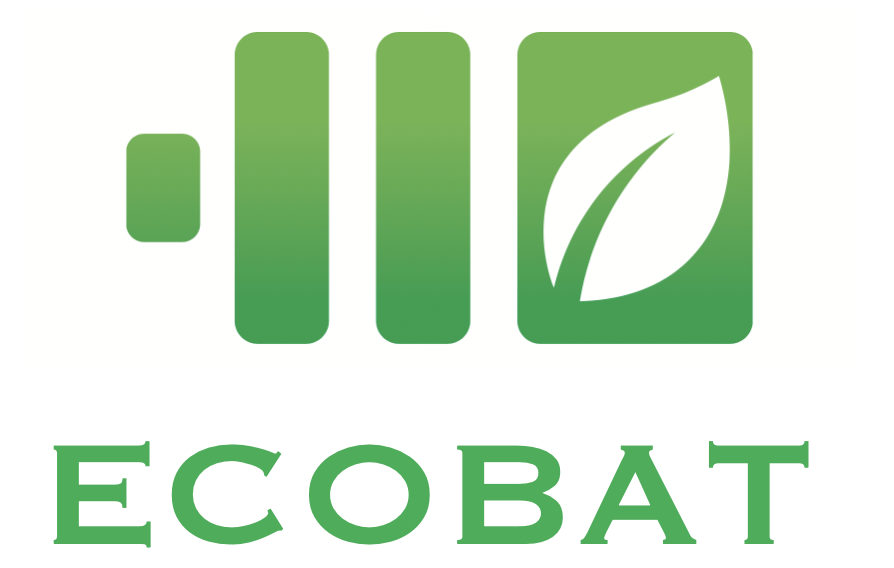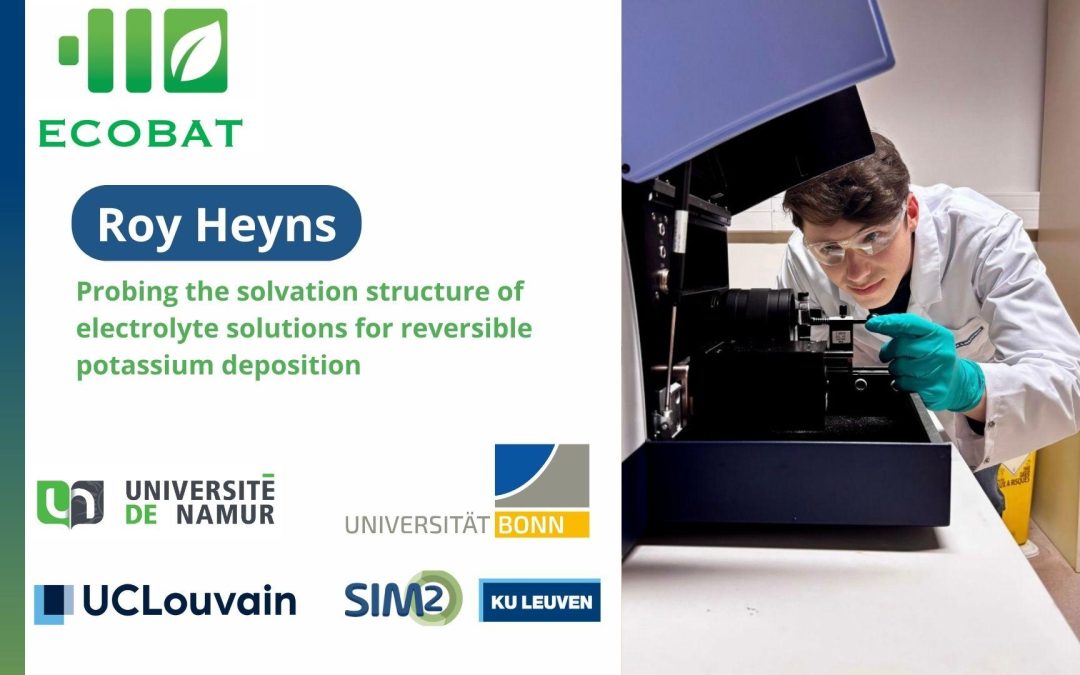Roy, a native of Turnhout (Belgium) discovered his passion for chemistry early on. He pursued a professional bachelor’s degree in Chemistry at UCLL (Leuven) before continuing with a bridging program and a Master’s in Chemistry at KU Leuven.His journey into battery technology began during an internship at Umicore, where he was introduced to the world of cathode materials—an area not typically covered in standard chemistry coursework. Inspired by this experience, Roy focused his Master’s thesis on battery technology at Solvomet, where he deepened his expertise. His dedication and enthusiasm for the battery field didn’t go unnoticed. After completing his studies, he was offered a position as a Researcher at Solvomet, where he continues to explore and develop innovative battery materials.
What are you working on within Ecobat?
Within the Ecobat project, I am focusing on electrolyte solutions for anode-free potassium metal batteries. My work is twofold:
- Fluorine-Containing Electrolytes – I explore highly concentrated, fluorine-based electrolytes, testing different solvents to analyze the formation of the solid electrolyte interphase (SEI)—a layer that forms on the electrode surface and plays a crucial role in battery performance and stability.
- Sustainable Fluorine-Free Electrolytes – At the same time, I am researching fluorine-free alternatives that are more environmentally friendly while ensuring the SEI remains mechanically stable and as thin as possible. The challenge lies in achieving a high concentration of potassium, as removing fluorine leads to solubility issues. To overcome this, I experiment with different polar aprotic solvents and optimize potassium concentration to develop an electrolyte that maintains mechanical stability and allows potassium ions to pass through while blocking electrons.
The ultimate goal of my work is to create an electrolyte that enables over 500 charge-discharge cycles (compared to the current 100) with a coulombic efficiency exceeding 99.5%. This breakthrough would significantly enhance the reversible deposition and stripping of potassium, overcoming a major challenge in battery technology.
What attracts you in this research project?
What I love most about this project is the freedom to experiment with different salts and solvents, letting me explore new and innovative combinations. I also get to synthesize compounds that aren’t commercially available, which is really exciting because it means I can test entirely new materials. On top of that, I run coin cell experiments, which gives me hands-on experience in how these electrolytes actually perform in a battery.
Since potassium is highly reactive, some of my work happens at UC Louvain, where the oxygen levels are kept below 1 ppm to create a controlled environment. Working there also means I get to collaborate with experts, which is incredibly valuable. Most of my time, though, is spent at Chem&Tech, and I also do electrochemical measurements at MTM, like cyclic voltammetry.
A big part of my research is figuring out how solvated species in the electrolyte solution affect battery performance. A stable SEI requires a highly concentrated electrolyte with well-formed contact ion pairs, where anions are properly coordinated with cations. Some decomposition compounds actually help SEI formation, so understanding these interactions is crucial. Thanks to advanced characterization techniques at Chem&Tech, I can analyze how different solvated structures influence SEI quality—one of the key factors in improving potassium metal batteries.
How do you see the batteries of the future?
I think we’re heading toward a future with a mix of different battery types, each suited for specific needs. Lithium-ion and lithium-metal batteries will still be the go-to for portable devices where high energy density is crucial. But for stationary energy storage, like storing power from solar panels and wind turbines, potassium batteries could play a big role.
When will we see potassium batteries on the market? That’s a tough question. Right now, sodium-ion batteries are starting to gain traction, but potassium is even trickier—it has lower energy density and some technical challenges to overcome. Realistically, we’re probably looking at several decades before they become commercially viable.
So why work on potassium batteries at all? Because the future of energy storage won’t be one-size-fits-all. We’ll need different battery technologies for different applications, and potassium might just find its niche. Could it turn out to be better than sodium in some ways? Maybe—but that’s exactly what I’m trying to find out!
How do you stay motivated to do research?
I stay motivated because I’m genuinely interested in science. Even when things don’t go as planned, I remember that a failed experiment is still valuable—it’s part of the process.
Honestly, my curiosity started back in high school when I only had two hours of chemistry a week and got to do a few small experiments each year. Even though it was limited, those experiments sparked my interest, and I’ve been hooked ever since. Now, I get to dive into experiments every day, and that’s what keeps me going.
What do you think you can do better than other people?
I wouldn’t say I’m necessarily better, but I think one of the most important things, especially in battery research, is to be critical and mindful. In my experiments, I really focus on listening to others—like how they prepare a coin cell or handle potassium metal. I ask a lot of people for their opinions and try to incorporate their experience into my own research.
Being critical is key. I always aim to get accurate results, but I also recognize that there are different ways to approach things. One goal of mine is to make reproducible coin cells, since different research groups use different methods and suppliers. There isn’t a universal standard for how to do it, so I try to bring consistency to my work by learning from others and finding the best approach.
What superpower would you choose and why?
I’d definitely choose to have 50 hours in a day. That way, I could get so much more done and still have some extra time to relax.
What activity helps you to fully disconnect?
I like to go to the gym to clear my mind and get a good workout in. When I want to relax, I’ll watch light series like The Office or Big Bang Theory. They’re perfect for just zoning out and having a good laugh after a busy day.
To learn more about the research group of Prof. Koen Binnemans at KU Leuven, click here.

